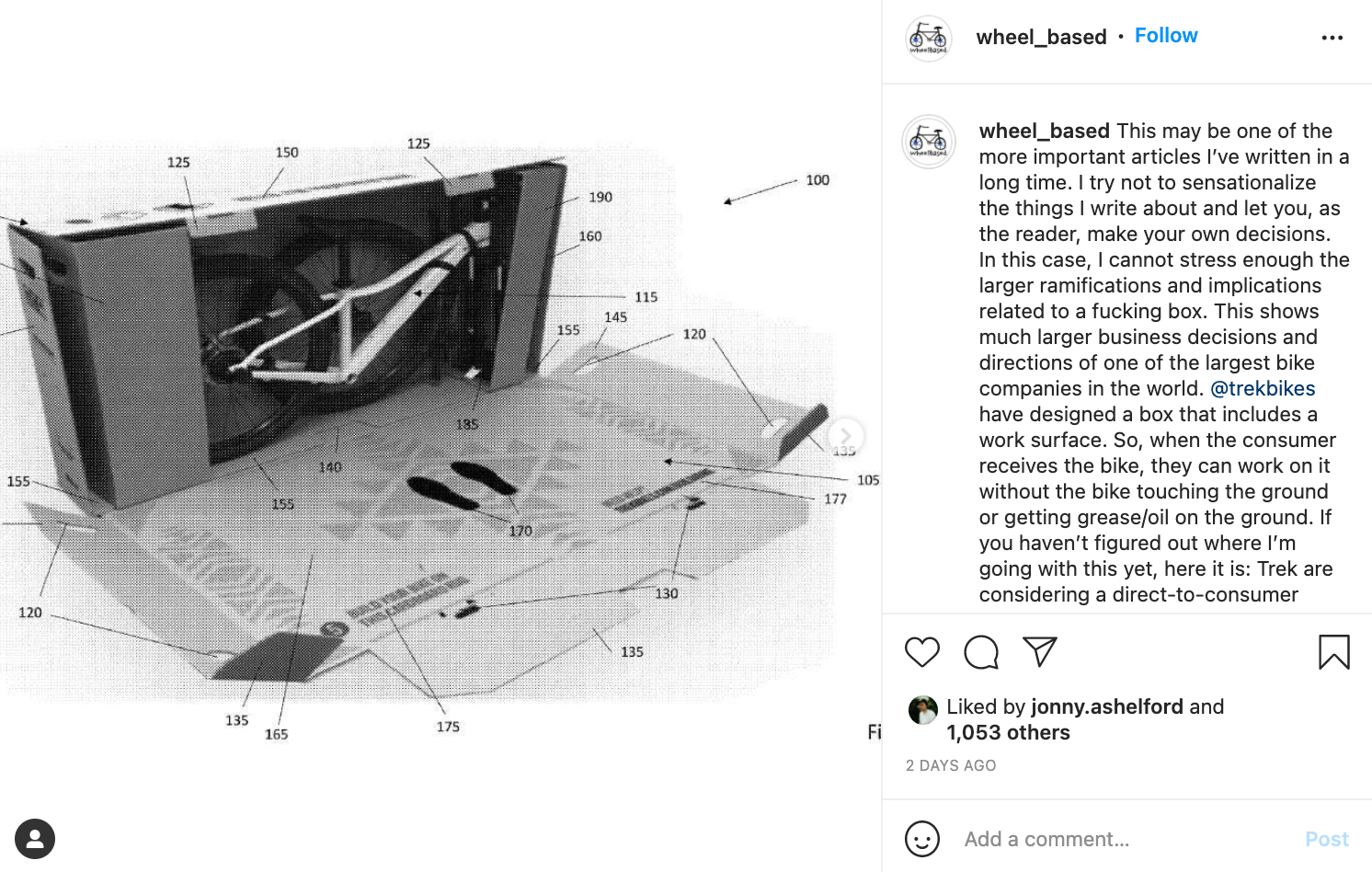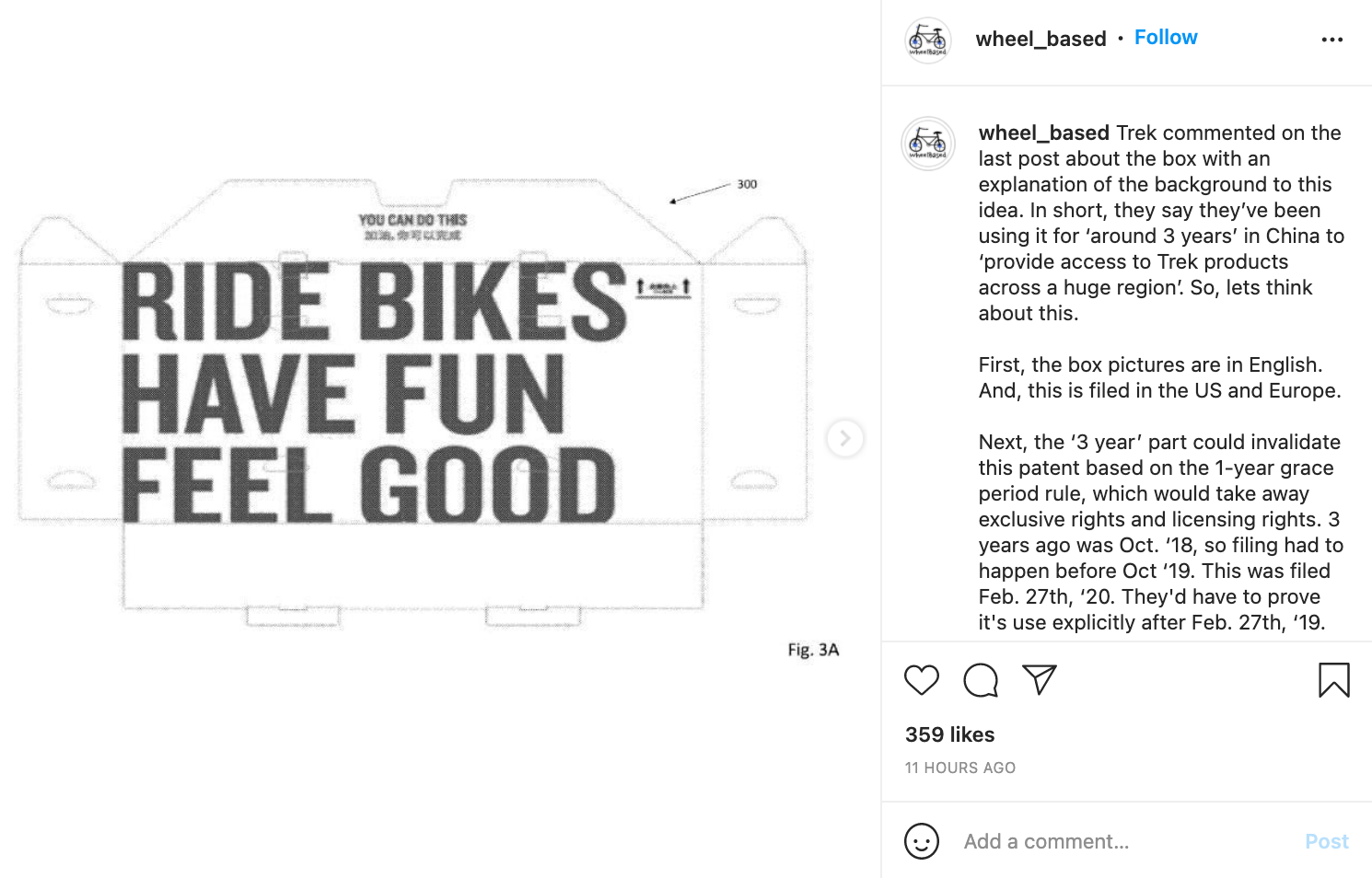Eagle-eyed patent analyst Daniel Bacon of Wheelbased spotted this application from Trek for protection of a box design. With many brands looking carefully at packaging, at first glance you might think ‘so what?’. But as Daniel points out, this box transforms into a mini home work space, complete with floor protection – which is important because Trek traditionally sells through its network of Trek stores and local bike shops.
Could this be a sign that Trek is preparing to sell direct to consumer? Will mail order Treks be a thing of the future? That would certainly be a significant shift for a brand heavily invested in bricks and mortar shops, and whose ‘All In’ commitments includes an expansion of shop presence into new areas.

Daniel speculated as much in a first Instagram post discussing the patent filing, which is discussed in more detail on his website:
This may be one of the more important articles I’ve written in a long time. I try not to sensationalize the things I write about and let you, as the reader, make your own decisions. In this case, I cannot stress enough the larger ramifications and implications related to a f**king box. This shows much larger business decisions and directions of one of the largest bike companies in the world. @trekbikes have designed a box that includes a work surface. So, when the consumer receives the bike, they can work on it without the bike touching the ground or getting grease/oil on the ground. If you haven’t figured out where I’m going with this yet, here it is: Trek are considering a direct-to-consumer business model, as this box is explicitly designed to be shipped to the home, not a bike shop. Here’s the line:
“Described herein are methods and systems for packaging bicycles that are to be directly delivered to end users.”
D2C allows manufacturers to lower costs, increase profits, or both. Every hand that touches the bike has to get paid, so reduce the number of hands. I’d like to point out this was filed a few weeks prior to the world shutting down, so don’t think this idea came from the supply issues. Trek were just ahead of the game.
Is this another nail in the coffin for local shops? I feel for them. What can they do? Not much. I fully expect this model to be used by other companies as well, and Trek will probably license this box to others.
Trek saw this post and responded on the WheelBased Instagram:
Here’s some background information that might be helpful. This is a bike box that we have been shipping in China for around three years. We use this box in China so we’re able to provide access to Trek products across a huge region with a smaller retail presence for a market with 1.4 billion people. It’s helped us get our products to remote areas where in some places there is little to no bicycle retail. We’re not currently planning on expanding its use beyond China.

Daniel has followed this up with a second Instragram post, in which he seems somewhat sceptical of Trek’s response:
Trek commented on the last post about the box with an explanation of the background to this idea. In short, they say they’ve been using it for ‘around 3 years’ in China to ‘provide access to Trek products across a huge region’. So, lets think about this.
First, the box pictures are in English. And, this is filed in the US and Europe.
Next, the ‘3 year’ part could invalidate this patent based on the 1-year grace period rule, which would take away exclusive rights and licensing rights. 3 years ago was Oct. ‘18, so filing had to happen before Oct ‘19. This was filed Feb. 27th, ‘20. They’d have to prove it’s use explicitly after Feb. 27th, ‘19. That could be enough to invalidate it, assuming it’s actually in China.
Rule: “If one discloses one’s own work more than 1 year before the filing of the patent application, that person is barred from obtaining a patent.”
They might be able to maintain the US patent based on this rule, but good luck with that.
“A person shall be entitled to a patent unless the invention was patented or described in a printed publication in this or a foreign country or in public use or on sale in this country, more than one year prior to the date of application for patent in the United States.”
I don’t see a provisional or foreign priority, so it wasn’t filed in China before the US patent. And it wouldn’t be wise to say the box in China is “similar” – and not the same — due to the ‘obvious variant’ rule. Again, assuming there is a box in China.
So, there are two possible scenarios: If there’s a box in China like they say, the patent may be invalidated by their time-table admission. If it’s not in China and they want to keep this patent, well then you do the math. Lose-Lose. Btw, this isn’t a legal opinion, just observations.
But, I hope I’m wrong. I don’t want to see this taken away from the inventor. And it’s totally possible it is in China, and it won’t come to the US. In that case, the possibility of invalidation is the issue.
Perhaps there’s a half-way house explanation too? If Trek is using this packaging to reach communities in China without stores, perhaps it could be considering something similar in underserved communities in the USA? A pop-up shop/community bike event might fit with its All In commitments… you ship a stack of bikes in boxes to a community hub, they’re built up on site without need for an actual bike shop or specialist skills, and the residents of the community can ride off with their new bike?
While Trek might not currently have plans to use the box outside China, it doesn’t seem like a bad idea to protect your design just in case – they say it’s being used to reach remote areas, and there are certainly plenty of those in the USA and Canada – and the north of Scotland too. So, maybe they just don’t want the other consumer direct brands to pinch their box design? It’s pretty nifty.
Thanks to Daniel for the analysis, go give him a follow.







If the box doesn’t cost trek any more, introducing the new box-design to their B2B customers in the west would be easier on the backs of those building bikes in shops. hauling trek marlins out of the current boxes is a pain in the butt when trying to keep up with demand last year especially!
It’s a case of either Trek are lying and they are about to start a B2C operation in Europe/States or as Trek state they have invented a great box for a B2C bike company and they don’t want Canyon, YT, etc nicking its design. I suppose only time will tell.
With regards to B2C I like the way Commencal do it where they charge (I think) €150 to build a custom spec bike. The customer can then either put it together themselves and save some cash, pay Commencal to do it or book it into a bike shop to have them do it.
I wonder if Trek had a B2C offering that was only on bikes that were over £1,500, that had a discount from the instore equivalent of £150 and required a lot of assembly whether the brick n’ mortar bike trade would find that acceptable.
I’d be interested to see what tools come in the box (as per link). it’s worded like a flat pack. you get all you need included. but I see a frame with no BB or chainset installed, no chain fitted. Thats a small workshop tool kit there.
Companies take out lots of patents for lots if reasons. Maybe they are protecting there rights to an option that they don’t currently see a need for but might need one day. Maybe they wanted a contingency for if global events close stores. Maybe they want to protect stores by preventing other companies using these boxes. Maybe they want to licence the box to some one else. IBM took out over 9000 us patents last year
Pretty sure most of my patents have never been used in anger, companies just file them ‘in case’.
Maybe they just came up with a good idea and plan to license it to others…. or start a direct sub-brand…
All these options are possible – patents are filed for all sorts of reasons. It’s my job, for better or worse. Their story makes sense, they come up with a good box and apply for a patent for it to prevent others from nicking the idea. This leaves them the option to exclusively use it themselves or licence it to others down the line. Does it mean they’re changing their business model? No. Does it mean that they’re thinking about B2C? Well, they’d not be running their business very well if they’re not at least thinking about it.
Did I miss it, or are there no details about the specific claims that make this patentable? The claims are the most important part of the patent and the wording of them is vital to ensure it’s not simple to get around.
That would be a logical next step, with how Trek has shafted many small bike shops at least here, during the pandemic. They flat out canceled all bike preorders for the year 2022. Like ok, thats cool. After not being able to deliver more than a handful the whole year 2021. What do they think all these dealers can do? At least we made our conclusions at the shop I work, we will no longer sell Trek going forward.